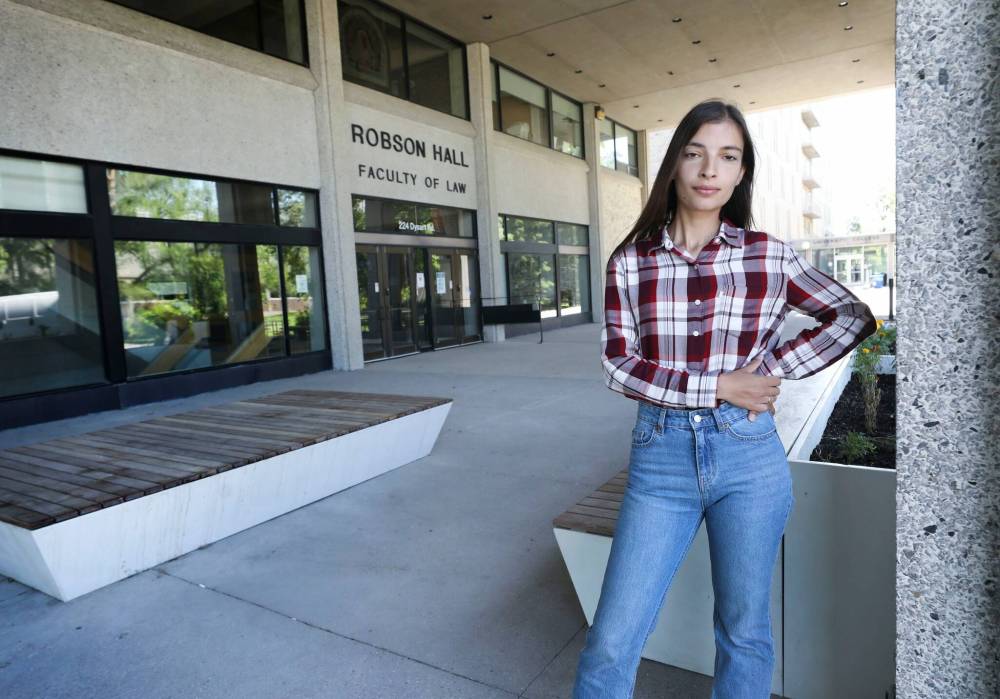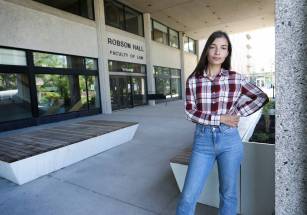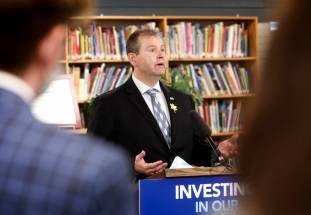U of M opens research doors to Ukrainian scholars fleeing war
Read this article for free:
or
Already have an account? Log in here »
To continue reading, please subscribe:
Monthly Digital Subscription
$19 $0 for the first 4 weeks*
- Enjoy unlimited reading on winnipegfreepress.com
- Read the E-Edition, our digital replica newspaper
- Access News Break, our award-winning app
- Play interactive puzzles
*No charge for four weeks then billed as $19 plus GST every four weeks. Offer only available to new and qualified returning subscribers. Cancel any time.
Read unlimited articles for free today:
or
Already have an account? Log in here »
Hey there, time traveller!
This article was published 21/07/2022 (887 days ago), so information in it may no longer be current.
Natella Roskoshna spent much of the winter preparing to take on a teaching gig at her alma mater, Karazin Kharkiv National University — until one morning in late February, when she was jolted awake at 5 a.m. to “a huge vibration and a very loud sound.”
Bombings and related commotion became the soundtrack of her life, as Russian forces attacked Kharkiv, Ukraine. When her university’s law faculty building turned to rubble, Roskoshna and academic and husband Illia Roskoshnyi began panicked job searches.
“We didn’t know what to do, and we realized we needed to continue our life. You never know when the rocket will hit next,” she said.
The couple arrived in Manitoba at the end of May, making them the first of a group of 20 Ukrainian scholars who will resume research at the University of Manitoba while Russia’s war on their home country rages on.
“We didn’t know what to do, and we realized we needed to continue our life. You never know when the rocket will hit next.” – Natella Roskoshna
Roskoshna’s expertise is in mediation and restorative justice; she defended her master’s dissertation on alternative dispute resolution in December 2021. Her husband, whom she met as a fellow law student in Kharkiv, is interested in constitutional and legal principles of human-state interaction in information societies.
U of M joined the Scholars at Risk network in the spring, several months after Russian President Vladimir Putin’s forces launched an attack on Ukraine, citing the neighbouring country’s modern, Western-leaning status as a threat.
The collective, representing post-secondary institutions committed to promoting academic freedom amid global conflict, arranges for temporary research positions at member schools. The network’s aim is to ensure professors in harm’s way can continue working at a host campus until conditions improve in their home country.
Scholars at Risk represents upwards of 500 institutions located everywhere from Australia to Nigeria. There are 30 Canadian members, including the University of Winnipeg and U of M.
“Simple things was very scary. We didn’t go for groceries for around a month-and-a-half. We tried to survive with things that we had.” – Natella Roskoshna
Manitoba’s largest university has earmarked a total of $1.75 million to support Ukrainian academics and students who have been affected by war-related disruptions.
U of M is supporting 20 scholars with up to $50,000 each to continue research and instruction on Winnipeg soil. The bills of the year-long academic stipends are being covered with equal contribution from central administration and a university faculty, school or college, although the latter parties may offer additional compensation to recipients.
The ongoing war in Ukraine prompted the university to officially join the network, although many professors have long been involved in the international community, said Digvir Jayas, vice-president (research and international) at the U of M.
Jayas said university leaders felt a moral obligation to help and providing research internships is a fitting response.

For Roskoshna and Roskoshnyi, the prospect of moving to Manitoba was appealing due to the province’s sizable Ukrainian population and the fact English — their second language — is the primary vernacular.
The duo moved across the world, each with a single suitcase in hand, without knowing a single resident aside from their U of M contacts. They remain deeply concerned about their friends and family who have chosen to stay in Ukraine, Roskoshna said.
Given they have been unable to do much work since the war began, she expressed relief they have a shared office at Robson Hall.
“I was scared even to go to the shower because — it doesn’t make any sense, but in my imagination, it was like I will be more vulnerable if I go to the shower. Simple things was very scary. We didn’t go for groceries for around a month-and-a-half. We tried to survive with things that we had,” Roskoshna said.
“It’s hard to think about our future because I don’t know what it will be.” – Natella Roskoshna
International researchers who seek temporary refuge in Winnipeg will “culturally enhance campus,” Jayas said, noting they will also expose community members to how war affects individuals on a personal level. “Scholars will enhance, not only (Manitobans’ understanding of) issues around the world, but also broaden the research expertise in their unit or department.”
The recipients who have been approved to date will work in arts, education, law, social work, science and business faculties. It is possible the U of M may hire some of the scholars on a permanent basis after their contract is complete, Jayas said.
“It’s hard to think about our future because I don’t know what it will be,” Roskoshna said, adding she is grateful to everyone who has supported their move and would be keen to stay in Winnipeg if an opportunity arises.
“But now, I’m appreciating this part of stability in our life because we have got something that allowed us to feel more stability, more safer in this situation of uncertainty.”
maggie.macintosh@freepress.mb.ca
Twitter: @macintoshmaggie

Maggie Macintosh
Reporter
Maggie Macintosh reports on education for the Winnipeg Free Press. Funding for the Free Press education reporter comes from the Government of Canada through the Local Journalism Initiative.
Our newsroom depends on a growing audience of readers to power our journalism. If you are not a paid reader, please consider becoming a subscriber.
Our newsroom depends on its audience of readers to power our journalism. Thank you for your support.





